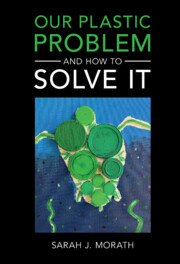Book contents
- Our Plastic Problem and How to Solve It
- Our Plastic Problem and How to Solve It
- Copyright page
- Contents
- Acknowledgments
- Abbreviations
- Introduction
- Part I Plastic in the Environment
- Part II Multimodal Approaches to Solving Our Plastic Problem
- 4 Federal Efforts
- 5 State and Local Efforts
- 6 International Efforts
- 7 Business, NGO, and Individual Efforts
- Part III Innovation and Design
- Index
4 - Federal Efforts
from Part II - Multimodal Approaches to Solving Our Plastic Problem
Published online by Cambridge University Press: 17 March 2022
- Our Plastic Problem and How to Solve It
- Our Plastic Problem and How to Solve It
- Copyright page
- Contents
- Acknowledgments
- Abbreviations
- Introduction
- Part I Plastic in the Environment
- Part II Multimodal Approaches to Solving Our Plastic Problem
- 4 Federal Efforts
- 5 State and Local Efforts
- 6 International Efforts
- 7 Business, NGO, and Individual Efforts
- Part III Innovation and Design
- Index
Summary
News of plastic’s harm has made its way to Washington, DC. In October 2018, President Donald Trump signed the Save Our Seas Act of 2018 into law. The Act, which is not specifically aimed at plastics, reauthorizes the Marine Debris Program and “require[s] the National Oceanic and Atmospheric Administration (NOAA) to work with: (1) other agencies to address both land-and sea-based sources of marine debris, and (2) the Department of State and other agencies to promote international action to reduce the incidence of marine debris.” Advocates consider this a “modest, but important piece of legislation” because of the bipartisan effort to address the problem of global marine debris.
Individual members of Congress are taking an approach that specifically targets plastic pollution. In June 2019, Senator Tom Udall (D-NM) and Representative Alan Lowenthal (D-CA) wrote a letter to President Trump stating that there was “unified concern and a call to action from both parties in both chambers [of Congress] regarding the global plastic pollution problem.” While the lawmakers recognized the usefulness of plastics, they also reported many of the alarming statistics and numbers already recited in this book. The letter recommended that “departments and agencies across the federal government develop a coordinated interagency research and response plan to address th[e] growing problem [of plastic pollution].” Continuing with their efforts, on October 31, 2019, Udall and Lowenthal posted a draft of a proposed bill to address plastic pollution, which includes phasing out plastic. The bill was formally introduced in February 2020.
At the same time the draft proposal was being considered, over 100 environmental groups sent a petition to the Environmental Protection Agency, requesting that it strengthen the Clean Water Act (CWA) effluent limitations on facilities that convert fossil fuels to plastic.
This chapter addresses these recent actions as well as other ways in which the federal government can work to solve our plastic problem.
Keywords
- Type
- Chapter
- Information
- Our Plastic Problem and How to Solve It , pp. 57 - 90Publisher: Cambridge University PressPrint publication year: 2022

